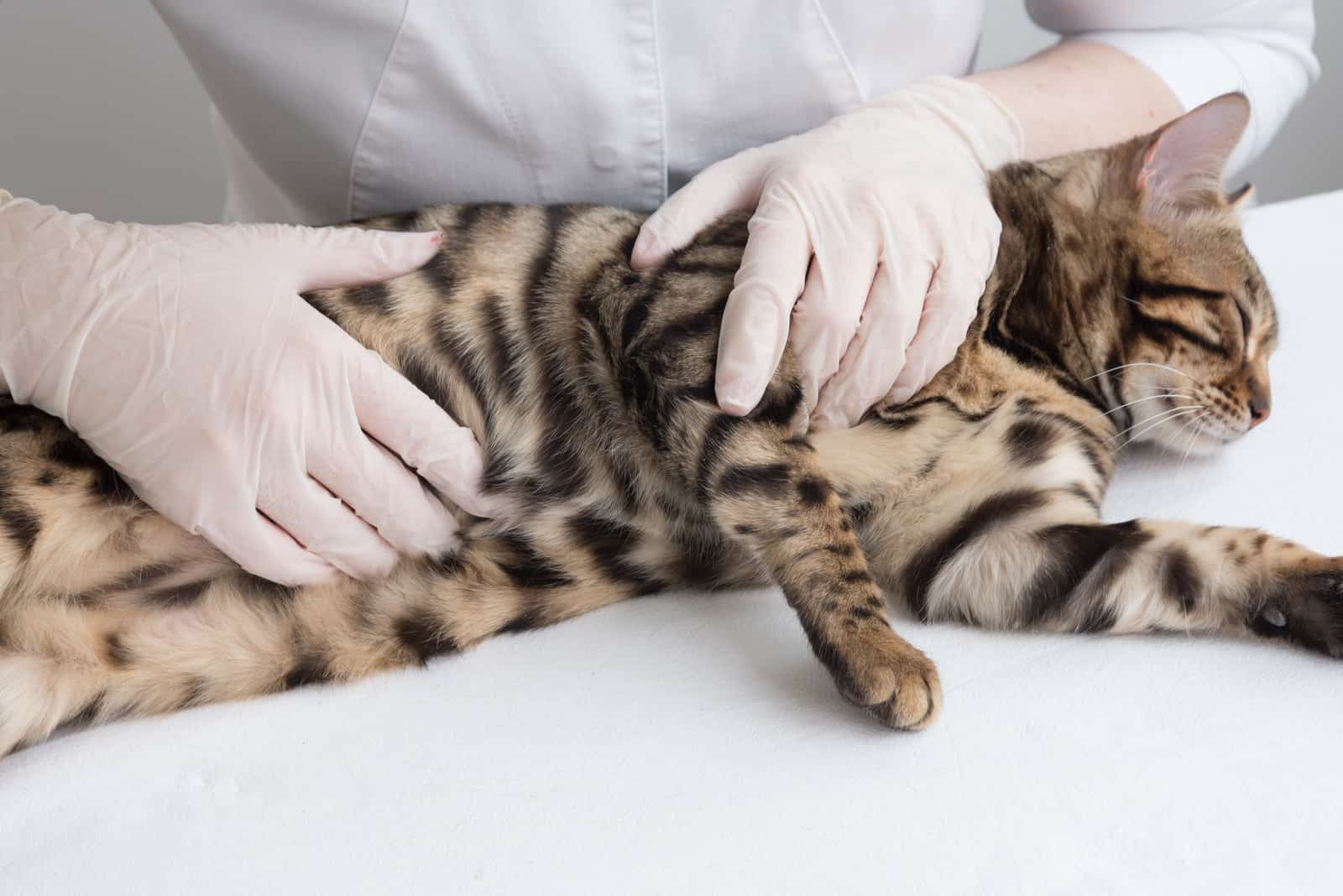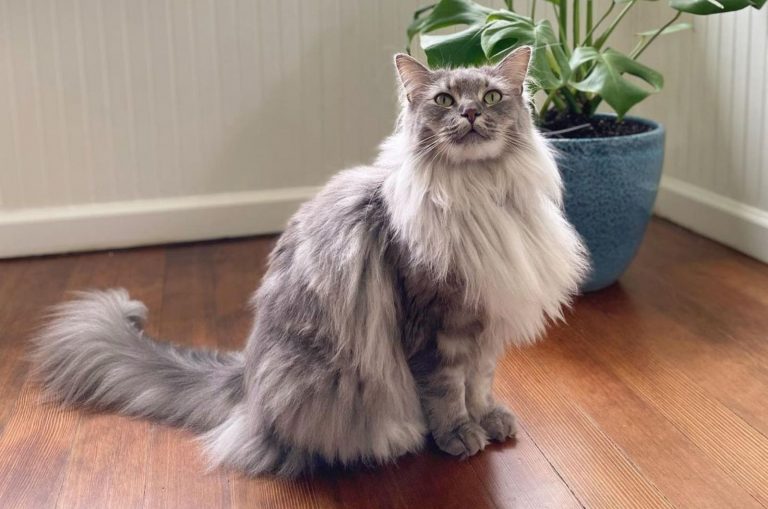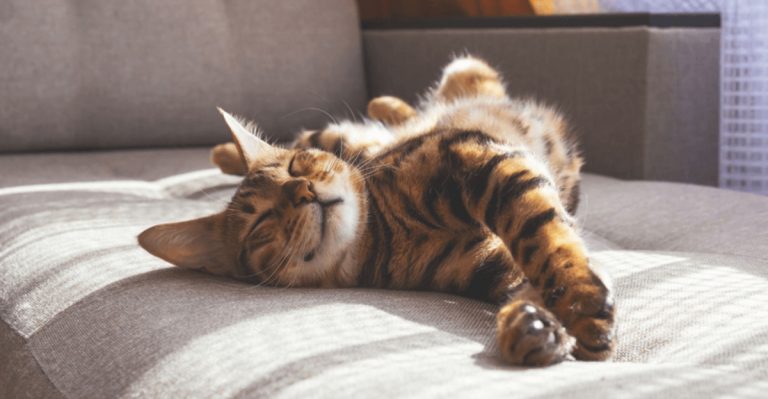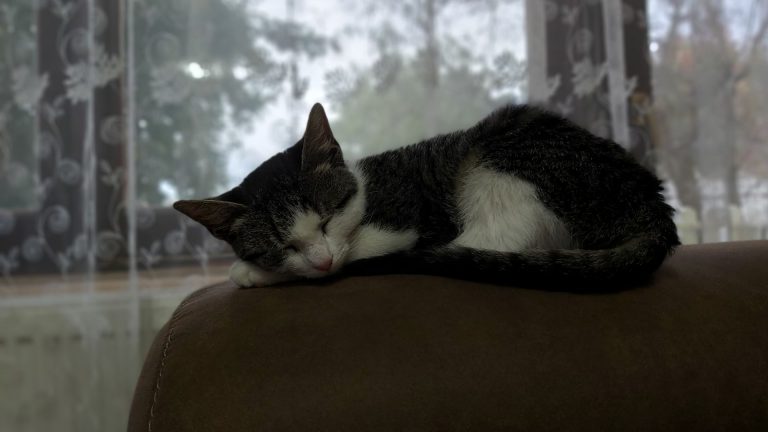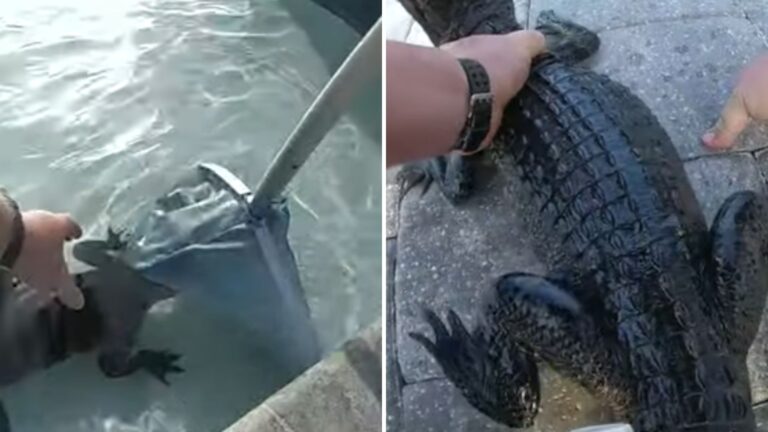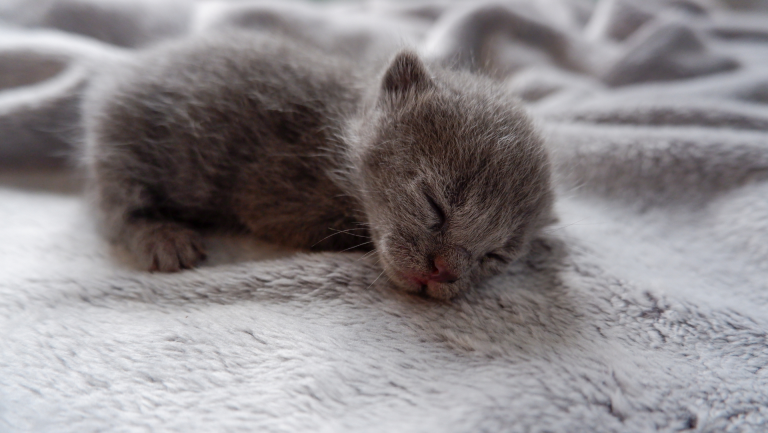Your Cat Sounds Congested But No Discharge? All You Need To Know
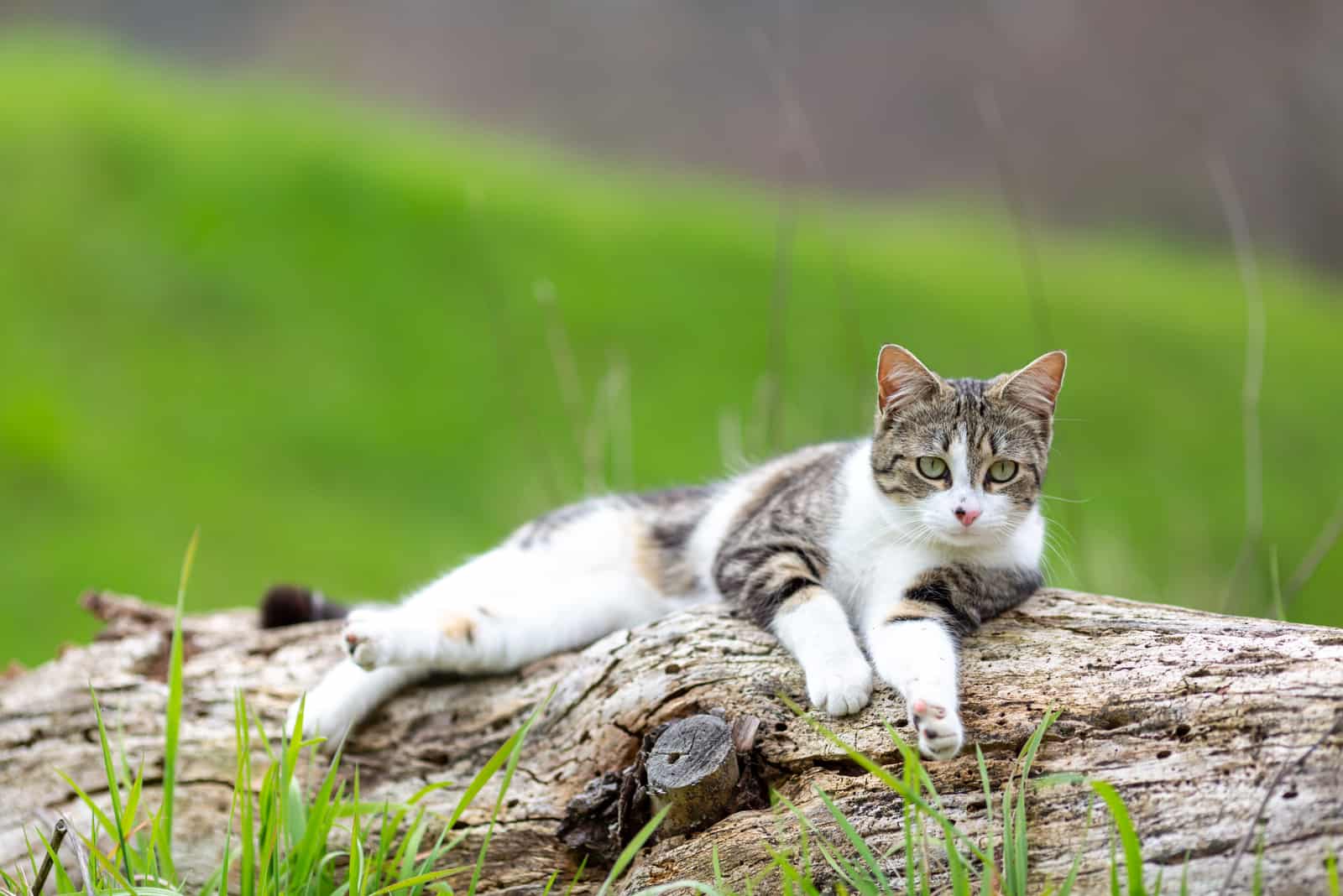
Every cat owner gets worried when something unusual starts going on with their cat.
When my cat got a stuffy nose, I immediately thought: Like owner, like cat since I have problems with my sinuses every now and then!
However, my cat sounded congested but there was no nasal discharge, which was strange to me. I was even surprised that a cat can have a stuffy nose when I first encountered it.
There are many different reasons why your cat may sound congested, but there may be no discharge whatsoever.
It is important for cat owners to educate themselves on the reasons for any symptoms that arise in their cat and to know when and how to react.
Breathing is important for all living creatures, so when our cats (who do not speak our language) have trouble breathing, it is only logical that we panic. All cat owners do.
This is why I am glad you’re here, because it is important to know what may lie behind your cat’s congested nose or throat.
Let’s have a closer look at all the possible reasons your cat sounds congested but no discharge is present.
Why A Cat Sounds Congested But No Discharge?
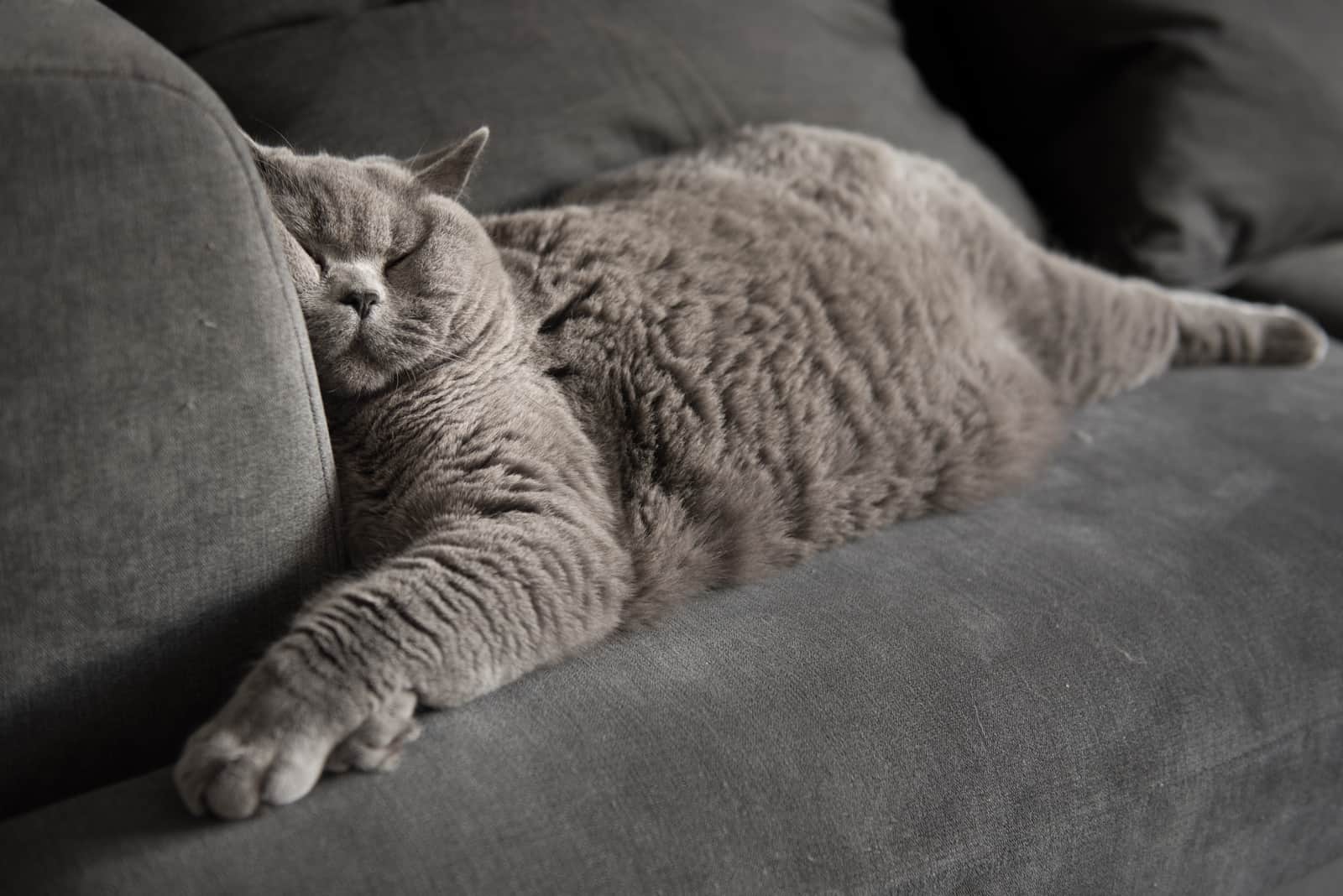
What is going on when a cat sounds congested but no discharge is visible? There are several reasons for this.
Normally, cat owners do not even hear their feline friends breathing. You can hear them purr, or meow of course, but breathing? No.
Then, you start hearing noisy breathing. Your cat is not sleeping and snoring, but simply breathing, and it is loud. You hear snore-like sounds or something similar to purring sounds.
Your cat is not breathing normally, as something is getting in the way of their normal breathing process.
They might have an issue with their sinuses, throat, larynx, nasal passages, lungs, or trachea. Something is affecting at least one of these parts of the respiratory system.
There are a few medical conditions associated with your cat sounding congested, so read carefully to work out which one of the reasons listed below apply to your cat.
Feline Rhinitis
Feline rhinitis is a condition in which the lining of the nasal cavity is inflamed. This swelling makes it hard to breathe.
Feline rhinitis can be over within a few weeks, or it may last for life as a form of chronic disease. It may damage the lining of the nasal cavity and this increases the risk of bacterial infections.
This is quite common in cats and it is mostly caused by feline calicivirus (or feline herpesvirus).
It can also be caused by bacterial infections, allergies, dental infections, neoplaysia (cancer that causes tissue growth), some fungal infections, and inflammatory polyps.
Symptoms other than sounding congested may include: sneezing, appetite loss, breathing through the mouth, and at some times nasal discharge (which makes it even harder for the cat to breathe).
This can be diagnosed by a simple physical examination. The vet will give a final diagnosis after checking that it is not some other disease that can have similar symptoms, such as asthma or bronchitis.
Your cat might be prescribed some antibiotics, intravenous fluids, food supplements, nasal flushing, corticosteroids, antifungal meds, or surgery; all depending on the stage of rhinitis.
There are some things you can do to make your home healthier for your cat.
You can use an air humidifier , give your cat warm food with stronger smells so it is more appealing to them, and provide your cat with some additional care and grooming.
You can help your cat by cleaning its face with a warm cloth, and also keep your cat warm at all times.
Upper Respiratory Infection
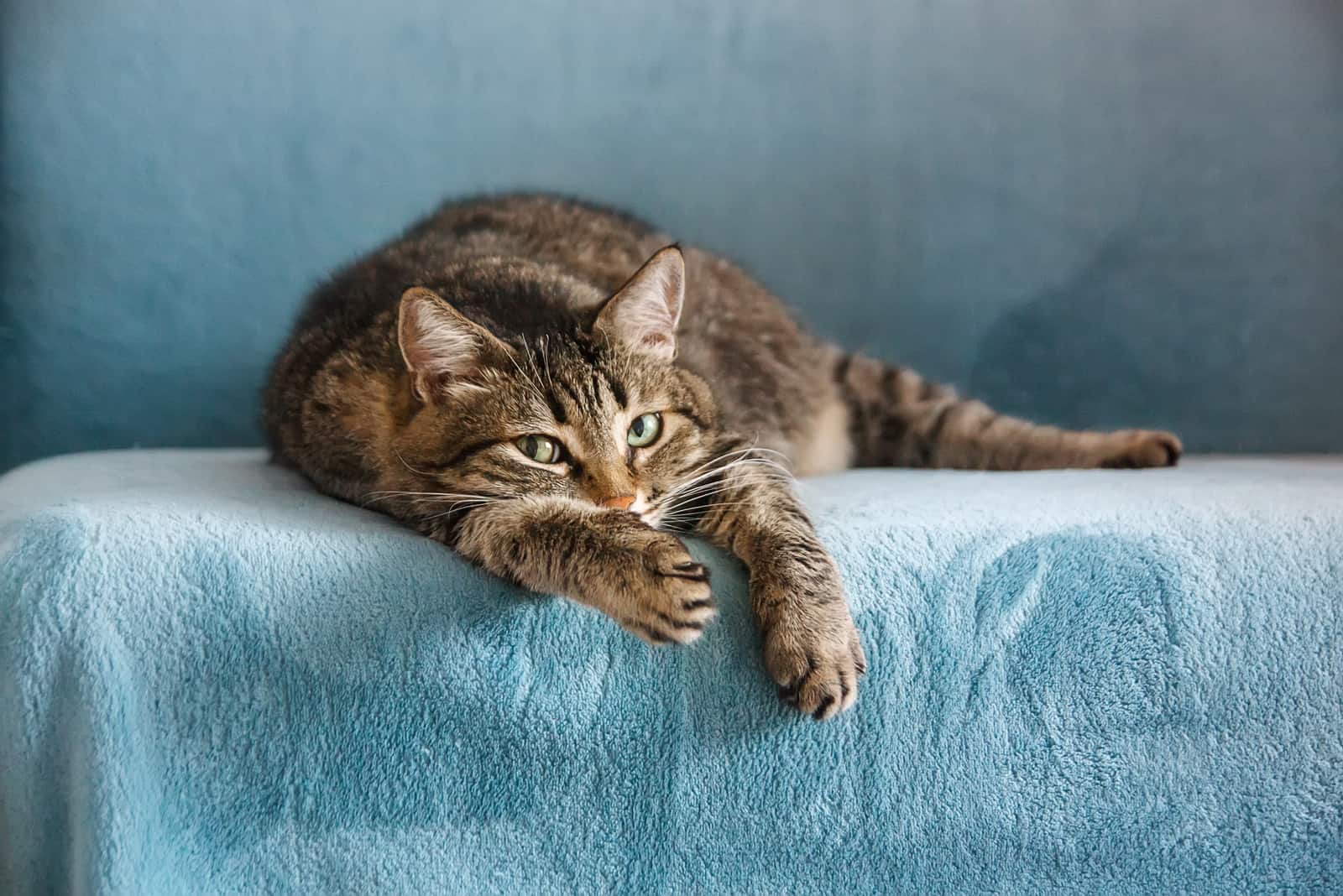
An upper respiratory infection in cats is quite common, and it is similar to a human cold. If your cat sounds congested but has no discharge, they are likely to have an upper respiratory infection.
It can be caused by different bacteria or viruses, which infect your cat’s throat, nose or sinuses . When your cat has a URI their immune system sends a message by producing too much mucus and the upper airways get inflamed.
Secondary bacterial infections of the nose or throat are usually a side-effect of another disease. In the cat’s case they occur after viral infections , or URI , or any of these other reasons listed.
Aside from congested breathing, you will notice sneezing, coughing, watery eyes, and discharge from your cat’s eyes and nose, either a congested sinuses or runny nose, and possibly ulcers in their nose or mouth.
Your cat can also begin to purr loudly and snore in their sleep, which is a sign that something is not right with their health.
The best thing you can always do is visit a vet.
Asthma
Asthma is a condition in which the airways are narrowed because of inflammation. Because of this, breathing is more difficult so any cat that has asthma will try and breathe through their mouth in order to inhale more air into the lungs.
Other symptoms you might notice if your cat has asthma include: coughing, rapid breathing, or difficult breathing in general.
The best way to help your cat and prevent asthma attacks is by reducing the allergens in your home.
You can introduce air humidifiers, because you want humid and warm air in your home. Dry air is not good for your cat’s respiratory system, nor for yours.
You can check your cat’s litter box and litter ingredients, and switch to a litter that doesn’t have as much dust, chemicals, or artificial fragrances.
Of course, regularly cleaning your house will prevent dust build up so you won’t need to worry about any asthma attacks caused by dust.
Also, always be careful with cleaning products.
You don’t want anything around that might be toxic for your cat, so try using products that are more natural, that do not contain strong chemicals, and which don’t have a strong smell.
P.s. Keep in mind that you first need to visit the vet, so you can get an official diagnosis, and possibly some medical prescriptions.
Hyperthyroidism
Hyperthyroidism is not the first thing that comes to mind when a cat sounds congested but no discharge whatsoever. However, it is a possible reason for your cat’s loud breathing.
Cats that have hyperthyroidism will breathe through their nose louder than usual, they might also have an increased thirst or appetite, urinate more frequently, behave in an aggressive way, lose weight, and their resting heart rate will increase.
Hyperthyroidism is a condition where the thyroid glands produce a lot more thyroid hormones, which is why your cat will still lose weight even though they may eat more than usual.
Thyroid glands become enlarged and since they are located in your cat’s neck, they disturb the natural air flow, which is why your cat sounds congested and breathes louder than usual.
If this is the case with your cat, you need to schedule an appointment with the vet so they can prescribe further treatment, probably radioactive iodine treatment, anti-thyroid meds, or surgical removal of the thyroid gland.
Chronic Obstructive Pulmonary Disease
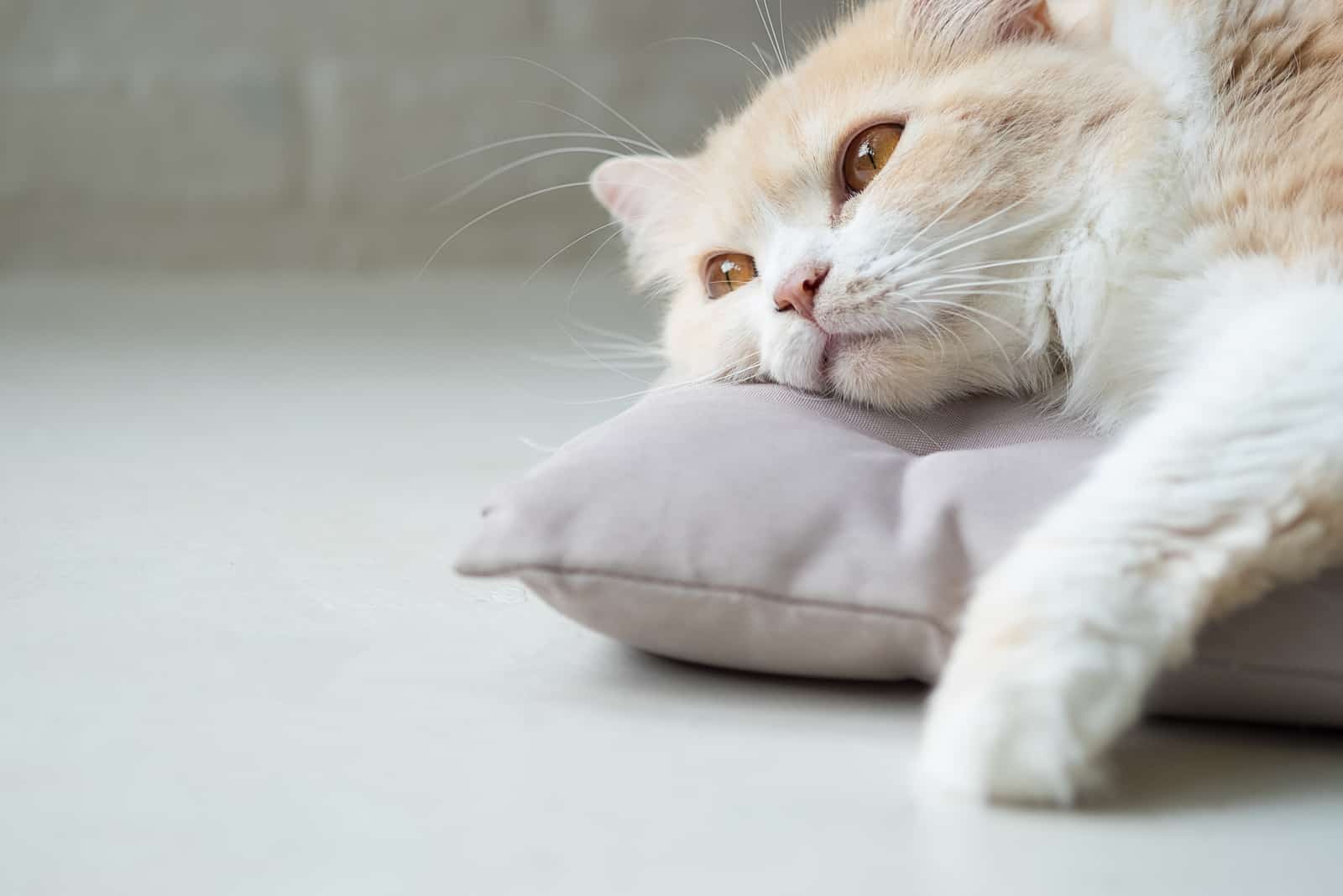
COPD or chronic obstructive pulmonary disease is, as the name suggests, a lung disease. It can be mild or severe, which can be tricky to diagnose at first since any stage of the disease may include heavy breathing.
Why cats have COPD and sound congested without any discharge is still not definitely proven. The causes are unknown, but veterinarians believe that cats who are exposed to irritants for a longer period of time are prone to it.
However, the same irritants can trigger asthma as well. Common causes for both are: different allergens, cigarette smoke, and other pollutants from the air.
COPD is more likely to happen to older cats than younger cats. While it is progressing, the sooner you treat your cat the better.
Pay close attention to your cat’s breathing, whether they sound congested, or out of breath, and if they have respiratory infections frequently.
These are most commonly connected to COPD, so if you notice any of these symptoms, don’t hesitate to call a vet.
Lung Fluids
Your cat may sound congested with no discharge seen because of a fluid buildup in their lungs, or around them. Whether the fluid is in or around the lungs, it will prevent the natural processes of the lungs while the cat is breathing.
The lungs are unable to expand as they should when the cat inhales and exhales, and this makes it hard for the cat to breathe and for their body to receive the necessary amount of oxygen.
This is a medical emergency, so you should visit the vet as soon as possible.
Symptoms that indicate the buildup of fluid in the lungs include:
– heavy breathing
– rapid breathing
– abdominal swelling
– dry cough
– weakness
– loss of appetite
– discoloration of nasal membrane
If your cat shows any of the symptoms listed above, go to the vet’s office.
The vet will help your cat immediately, probably stabilizing it and providing it with oxygen, after which they will remove the fluid and your cat will be able to breathe normally.
A Buildup of lung fluids can be caused by other serious diseases, e.g. viral infections, pneumonia, cancers, tumors, or congestive heart failure, which is why the vet will be keen to determine the exact cause of lung fluid buildup.
Foreign Bodies
Your cat might sound congested because something is in their respiratory system. There is a possibility of foreign bodies stuck in your cat’s trachea.
Cats like to explore many places, and play in different spots. They might inhale some foreign objects while they’re playing around somewhere, and this can stay inside their respiratory system.
This can make your cat sound congested because it may make it difficult for the cat to breathe normally. This is something your vet will have to deal with.
If you notice your cat’s breathing has changed, maybe they are breathing loudly or sound congested even while they purr, you should visit the vet so your cat doesn’t suffer any more.
Laryngitis
Laryngitis in cats, or a throat and vocal cords inflammation. This is a medical condition which is usually a symptom of another underlying condition.
Laryngitis is a state in which your cat’s larynx is inflamed, which results in your cat losing their voice. Your cat will probably avoid speaking while this condition is present.
It makes meowing uncomfortable so even if your cat does speak, it will be quieter than usual.
Symptoms of laryngitis other than your cat sounding congested (but no discharge) include:
– dry cough
– loud breathing
– difficulties when inhaling
– fever
– open mouth
– bad breath
– difficulties when swallowing
– cat being too irritable
– lethargy
– panting
If you notice any of the listed symptoms, go and see a vet. Your vet will diagnose the cat and prescribe the convenient treatment options.
If you act quickly and get the right diagnosis on time, your cat will fully recover and be back to itself in no time.
If the disease has progressed to a more severe stage, your cat will recover more slowly and might not be completely the same as they were before, but as long as they’re healthy, right?
Obesity
Obesity is never good. If your cat has become overweight, this can lead to respiratory conditions or diseases.
Your cat might sound congested because their lungs are fighting to inhale as much air as is needed for their bodies.
When your cat becomes overweight, this does not mean all their organs expand. Your cat’s lungs can only inhale as much air as it is needed for their normal body type.
A cat not receiving enough oxygen can only lead to other health issues, like kidney or liver problems.
Q & A
Is it normal for my cat to sound congested?
It is sometimes normal for a cat to sound a little congested but no discharge, however it is always best to visit the vet and be sure.
How do you decongest a cat?
You should act accordingly to your vet’s diagnosis. However, if your cat tolerates nasal sprays you can use one without medications in it.
You can put one or two drops into each nostril and this will help your cat deal with any mucus that is stuck inside; you can expect your cat to sneeze it out.
Why does my cat sound like he has mucus in his throat?
Your cat sounds like he has mucous in his throat because he probably does. A wet cough which sounds moist is probably a sign of a mild respiratory issue.
For your cat’s well being, you should visit the vet.
Why does my cat sound like its congested?
Your cat probably has a problem in their upper respiratory tract. Other than congestion, common symptoms you might notice include sneezing and watery eyes.
The most common causes for cats having difficulty breathing are viral or bacterial infections, but your vet will examine your cat’s nose and throat and give you an appropriate diagnosis.
What is the difference between a cat with a cold and a cat that is congested?
The main difference is discharge from your cat’s nose. Congestion is another symptom of a cat’s cold.
A cat can be congested when they have a cold, but being congested is not a definite sign of a cold.
What do I do if my cat is congested?
You can help your cat by wiping their face and nose with a warm washcloth. You can also use a piece of gauze to wipe your cat’s eyes.
If your cat sounds congested but has no discharge after you wiped their nose, you should schedule an appointment with the vet, just in case.
What are the causes of a cat sounding congested?
There are a few possible causes when a cat sounds congested, including:
Fungal infections, dental infections, rhinitis, upper respiratory infection, bacterial or viral infections, asthma, hyperthyroidism, lung fluids, COPD, foreign bodies, laryngitis, or even obesity.
How do you know if your cat has a respiratory infection?
You will notice symptoms such as:
Congested breathing, sneezing, coughing, watery eyes, either a congested sinuses or a runny nose, ulcers in their nose or mouth, gagging, loss of appetite or increased appetite, squinting, and lethargy.
Final Thoughts
It is important for cat owners to educate themselves so that they know the potential reasons for any symptoms that arise in their cat’s behavior and to know how to react.
This is why I am glad you are doing your research on why your cat sounds congested but no discharge, and I hope that I helped with it!
Breathing is important for all living creatures, so when our cats (who do not speak our language) have trouble breathing, it is only logical that we panic. All cat owners do.
There are, as I’ve noted, many reasons for your cat to sound congested, which can have similar symptoms.
Perhaps your cat paws at their nose, sniffles, or breathes through their mouth, etc. All of these can be combined at the same time or they may present separately but still cause your cat to sound congested.
The good thing is that the reason behind your cat sounding congested without any discharge coming out, can usually be solved and, in most cases, it is not severe.
Some cats, like Persians, have narrowed airways by nature so they might at times sound congested because of the slightest cold or allergy.
In any case, whatever the cause may be, your vet will always know what’s best so don’t hesitate to see them.
Your vet will examine your cat, maybe do an x-ray or blood tests, but they will always know how to get your furry friend back on track.

